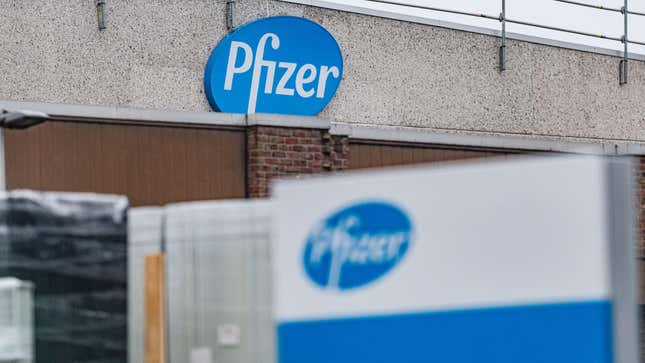
The dawn of treatments that can effectively prevent severe covid-19 may truly be here. On Friday, pharmaceutical company Pfizer announced the results of its clinical trial testing out a combination oral antiviral therapy. The study found that the two-drug combo reduced the chances of hospitalization and death among outpatients at risk of severe illness by 89% compared to placebo. Coupled with other promising treatments, doctors may soon have a bevy of options to treat early and late-stage cases of covid-19.
The Pfizer treatment is a mix of an experimental antiviral, code-named PF-07321332, with the existing antiviral ritonavir, used to treat HIV. The company has since trademarked the combination as Paxlovid.
In the Phase II/III results released Friday, more than 750 non-hospitalized but at-risk patients with covid-19 were randomized to receive Paxlovid or a placebo within three days of their symptoms starting. An interim analysis of the data (a common practice in scientific research) found that 0.8% of patients in the treatment group went on to need hospitalization within a month’s time, compared to 7.0% in the placebo group who were hospitalized and/or later died. None in the treatment group died, compared to seven patients in the placebo group who did. Similar results were seen in the groups who got the treatment or placebo within five days of symptoms beginning.
The stark contrast between the treatment and placebo groups was enough for an independent panel of experts observing the trial, on the advice of the Food and Drug Administration, to end it early. And the company has now said that it will soon submit the data to the FDA as part of its rolling application for an emergency use authorization of the drug.
“Today’s news is a real game-changer in the global efforts to halt the devastation of this pandemic. These data suggest that our oral antiviral candidate, if approved or authorized by regulatory authorities, has the potential to save patients’ lives, reduce the severity of COVID-19 infections, and eliminate up to nine out of ten hospitalizations,” said Pfizer CEO Albert Bourla in the company’s announcement.
The results have yet to be released to the public or outside scientists, an important step for confirming any scientific findings. But if they hold up, it would continue a recent trend in good news concerning covid-19 treatments. Yesterday, the UK became the first country to authorize an antiviral pill developed by Merck and Ridgeback Therapeutics, scientifically known as molnupiravir but now branded as Lagevrio. In a large trial, the drug was shown to reduce the risk of hospitalization and death by around 50%. Pfizer’s drug, if authorized, would be purportedly the first developed from the ground up to tackle the coronavirus, however, and may have fewer side-effects than molnupiravir.
Monoclonal antibodies have been shown to reduce the risk of worsening covid-19 as well, but these treatments are very expensive, require IV infusion, and are difficult to scale-up. Steroids such as dexamethasone have been available since last year but are only helpful for severe covid-19. So these oral antiviral pills would be a tremendous step forward.
As promising as this news is, the supply of these newer drugs will be constrained and mostly limited to the wealthiest countries for quite some time—an all-too-common occurrence for covid-19 therapeutics during the pandemic. Merck has pledged to have 10 million doses of Lagevrio available by the end of the year, though much of this supply has already been reserved, according to the Associated Press. Pfizer has said it may have enough doses available for 180,000 people before the end of the year and up to 21 million doses by mid-2022.
There is some hope that cheaper and effective treatments may soon be widely available for the rest of the world. Last week, a clinical trial of a generic antidepressant called fluvoxamine was found to reduce the risk of prolonged care and hospitalization by 32%. And there are recently approved and upcoming vaccines in the pipeline that are being produced explicitly for the developing world.